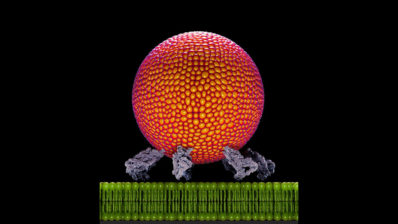The Department of Medicine and Life Sciences (MELIS-UPF) and the UPF spin-off Integra Therapeutics participate in a consortium with other research centres and companies to develop new viral treatments designed with artificial intelligence (AI). The consortium also includes the Molecular Biology Insitute of Barcelona (IBMB-CSIC), the Centre for Energy, Environmental and Technological Research (CIEMAT) and the companies VIVEbiotech and OneChain Immunotherapeutics.
AI will make it possible to design customised viral vectors for the treatment of cancers and rare diseases such as hereditary anaemias. Cell therapy is currently used for some of these cases: cells are isolated from the patient, modified to ‘correct’ them genetically, and reintroduced. The application of artificial intelligence algorithms, such as those used in text processing, will allow new DNA and protein sequences to be designed and introduced directly into the patient, avoiding the need to remove cells for modification and subsequent re-implantation.
This is a breakthrough for patient comfort and also reduces the cost of treatment. Although these early studies focus on treatments for cancer and blood diseases, in the future they could be used to treat autoimmune diseases or ageing.
“Applying AI with directed evolution techniques means we can optimize the efficiency and accuracy of the identification, direction and delivery process of the new viral particles to specific cells of the patient’s organism in order for them to act exclusively in the cells requiring treatment”, explains Marc Güell, director of the Translational Synthetic Biology Lab at UPF and co-founder of Integra Therapeutics together with its CEO, Avencia Sánchez-Mejías.
This three-year project is one of the 40 projects selected by the new TransMisiones programme of the spanish Ministry of Science, Innovation and Universities and the Centre for Technological Development and Innovation (CDTI). It will receive 3.8 million euros in funding. The TransMisiones programme aims to improve the impact of R&D&I with a new model of public-private collaboration, establishing priority challenges for research and coordinating the calls for proposals from the different R&D funding agencies (CDTI, AEI and ISCIII).








What an exciting development! Using AI to design customized viral vectors for cancer and rare disease treatment has immense potential to revolutionize healthcare. It’s great to see public-private partnerships like this driving innovation and advancing therapies for patients.
Thank you for your comment!